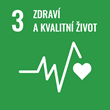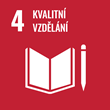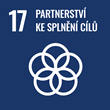Informace o projektu
National research infrastructure for biological and medical imaging
- Kód projektu
- LM2018129
- Období řešení
- 1/2020 - 12/2022
- Investor / Programový rámec / typ projektu
-
Ministerstvo školství, mládeže a tělovýchovy ČR
- Velké infrastruktury pro výzkum, vývoj a inovace
- Fakulta / Pracoviště MU
- Středoevropský technologický institut
- Další fakulta/pracoviště MU
- Fakulta informatiky
- Spolupracující organizace
-
Fyziologický ústav AV ČR, v. v. i.
Ústav experimentální botaniky AV ČR, v. v. i.
Ústav molekulární genetiky AV ČR, v. v. i.
- Odpovědná osoba Prof. Pavel Hozák, Ph.D.
Univerzita Karlova
Univerzita Palackého v Olomouci
Vysoké učení technické v Brně
Biologické centrum AV ČR, v. v. i.
The national research infrastructure for biological and medical imaging is built as a distributed infrastructure of leading imaging facilities in the Czech Republic. The infrastructure will assure open access to a wide range of imaging technologies and expertise to all scientists in the Czech Republic. The national imaging infrastructure is closely interlinked with the Czech Republic participation in the ESFRI large pan-European research infrastructure Euro-BioImaging. The backbone of the national infrastructure create two future Euro-BioImaging nodes (“Advanced Light and Electron Microscopy Multi Modal Multi Sited Node” composed of the Institute of Molecular Genetics Academy of Sciences, the Charles University, BioCeV , the Institute of Physiology of the Academy of Sciences and “Advanced Light Microscopy and Medical Imaging Multi Modal Multi Sited Node” composed of the Masaryk University Brno, CEITEC, the Institute of Experimental Botany and the Institute of Scientific Instruments of the Academy of Sciences). These institutions are complemented by the imaging facilities of the Biology Centre of the Academy of Sciences and Palacky University which possess unique imaging technologies and expertise in the context of the Czech Republic.
The national imaging infrastructure will provide Czech scientists with a permanent access to the cutting edge imaging technologies, which are not available in their own institutions. The infrastructure will support mutual cooperation of the scientists and sharing of best practices and knowledge, which contributes to the higher competitiveness of the Czech research. Special training programmes will help in increasing the qualification of scientists in biological and medical imaging, whose knowledge is a key pre-requisite for any research activity in biomedical sciences.
Cíle udržitelného rozvoje
Masarykova univerzita se hlásí k cílům udržitelného rozvoje OSN, jejichž záměrem je do roku 2030 zlepšit podmínky a kvalitu života na naší planetě.
Publikace
Počet publikací: 78
2020
-
Differentiation of brain tumours by magnetic resonance imaging: Methods
Rok: 2020, druh: Další prezentace na konferencích
-
Fundamentals of Light Microscopy
Rok: 2020, druh: Uspořádání workshopu
-
In Vivo Reporters for Visualizing Alternative Splicing of Hormonal Genes
Plants, rok: 2020, ročník: 9, vydání: 7, DOI
-
Poly(ADP-ribose) glycohydrolase coordinates meiotic DNA double-strand break induction and repair independent of its catalytic activity
Nature Communications, rok: 2020, ročník: 11, vydání: 1, DOI
-
Processing and Analysis of Biological Images: Focus on Cell Tracking
Rok: 2020, druh: Uspořádání workshopu
-
Superresolution Spinning Disc Microscopy - Principles, Advantages, and Limits
Rok: 2020, druh: Uspořádání workshopu
-
The first copper(II) complex with 1,10-phenanthroline and salubrinal with interesting biochemical properties.
Metallomics, rok: 2020, ročník: 12, vydání: 6, DOI
-
Thrombus Imaging Using 3D Printed Middle Cerebral Artery Model and Preclinical Imaging Techniques: Application to Thrombus Targeting and Thrombolytic Studies
European Journal of Pharmaceutics and Biopharmaceutics, rok: 2020, ročník: 12, vydání: 12, DOI


